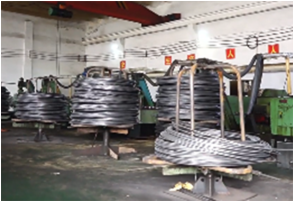сеп. . 04, 2024 05:59 Back to list
various types of bolts
Various Types of Bolts
Bolts are essential fasteners used in a plethora of applications, from construction to machinery and automotive industries. Understanding the different types of bolts available can help in selecting the right one for specific tasks, ensuring structural integrity, safety, and efficiency.
1. Hex Bolts
Hex bolts, or hexagonal head bolts, are one of the most common types. They have a six-sided head and are typically used with a nut for fastening two or more objects together. The hex shape allows for a wrench to grip securely, providing excellent torque. Hex bolts can be found in various grades and materials, making them suitable for light and heavy-duty applications alike.
2. Carriage Bolts
Carriage bolts have a smooth, rounded head with a square section directly beneath it. This design prevents the bolt from turning when a nut is tightened. Carriage bolts are often used in wood-to-wood fastening as well as in securing metal and wood together, making them popular in furniture assembly and joining wooden structures.
3. Lag Bolts
Lag bolts, or lag screws, are heavy-duty fasteners with a hexagonal head and a heavy, coarse thread that extends down their shaft. They are primarily used in wood applications where a strong hold is necessary, such as in building decks, framing, or securing heavy objects to wooden surfaces. Their robust construction allows them to withstand substantial stress without stripping.
4. Anchor Bolts
Anchor bolts are used to attach structures to concrete. These bolts can be cast in place during the concrete curing process or installed afterward using expansion methods. Commonly found in building foundations, these bolts play a crucial role in securing structural elements and maintaining stability in buildings and infrastructures.
various types of bolts

5. Eye Bolts
Eye bolts are characterized by a looped or 'eye' head, designed for connecting a cable or rope for lifting or securing items. They come in different materials and sizes, making them versatile for various applications, including shipping, construction, and even in household applications where securing items is necessary.
6. Shoulder Bolts
Shoulder bolts have a smooth, cylindrical section (the shoulder) that provides a precise pivot point for rotation. They are commonly used in applications that require a shaft to rotate or move smoothly against another object, such as in machinery or hinges.
7. Set Screws
Set screws are similar to regular screws but are specifically designed to secure an object within or against another object. They typically have a hexagonal socket or flat end for tightening. Set screws are widely used in coupling and securing items such as pulleys and gears.
8. Flange Bolts
Flange bolts have a built-in washer at the base of the head. The flange distributes the load over a larger area, which helps to prevent damage to the material being fastened. These bolts are commonly utilized in applications where a strong, vibration-resistant hold is necessary, such as in automotive and machinery settings.
Conclusion
The variety of bolt types available ensures that there is a suitable option for nearly every fastening requirement. Properly selecting the right type of bolt can enhance safety, durability, and performance in various projects, from simple home repairs to complex industrial applications. Understanding the specific features and intended uses of each type is essential for achieving the best results in construction and manufacturing processes.


